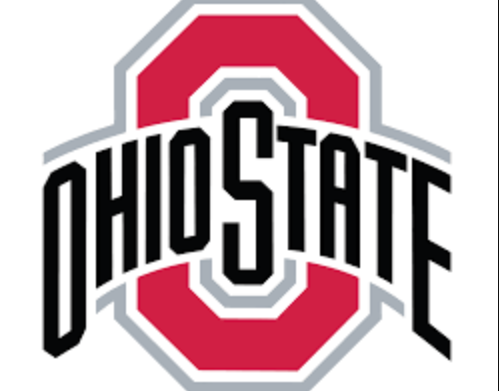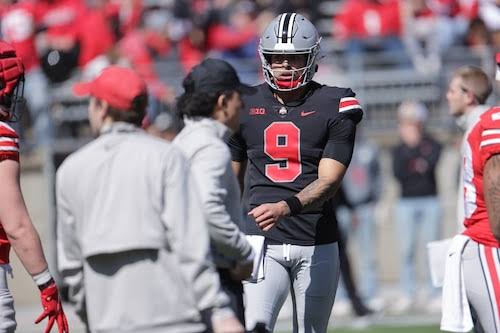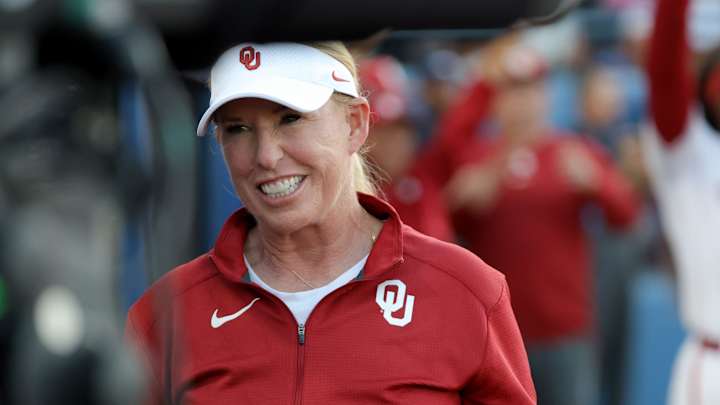
Ryan Day’s Coaching Tenure Under the Microscope: Desmond Howard Adds Fuel to the Fire…
Ryan Day, the head coach of the Ohio State Buckeyes, has undeniably achieved considerable success during his tenure. Boasting a 66-10 overall record since taking over for Urban Meyer in 2019, Day has led the Buckeyes to four College Football Playoff (CFP) appearances and a national championship game in the 2020 season. Yet, as the pressure mounts following Ohio State’s fourth consecutive loss to Michigan the program’s longest losing streak to its archrival since the early 1990s Day has found himself in the crosshairs of criticism.
One prominent voice joining the conversation is former Michigan star and ESPN College GameDay analyst Desmond Howard. Despite acknowledging Day’s winning record, Howard argued that his performance in high-stakes games calls into question whether he’s earned the benefit of the doubt as one of college football’s elite coaches. Howard’s comments, combined with the growing dissatisfaction among a segment of Buckeye fans, paint a complex picture of Day’s legacy in Columbus.
This article explores the dynamics surrounding Ryan Day’s coaching career, examining his strengths, weaknesses, and the criticisms levied by Howard and others. We’ll also analyze the broader implications of Day’s tenure for Ohio State’s program, its rivalry with Michigan, and its standing on the national stage.
A Stellar Start Overshadowed by Recent Struggles
When Ryan Day took the reins at Ohio State, he inherited a program already operating at peak performance under Urban Meyer. Day’s seamless transition to head coach led to immediate success, with the Buckeyes dominating the Big Ten and earning CFP berths in 2019 and 2020. His offensive acumen, particularly as a play-caller, quickly earned him praise as one of the brightest minds in college football.
However, as Day’s tenure has progressed, the narrative around him has shifted. While his record remains impressive, losses in pivotal games have increasingly defined his legacy. Chief among these is the recent skid against Michigan. For a program that views “The Game” as the ultimate litmus test, losing four consecutive matchups to the Wolverines has become a significant blemish on Day’s resume.
Desmond Howard highlighted this dynamic, emphasizing that Ohio State’s historical dominance against Michigan in the 21st century raised expectations for Day to continue that trend. Instead, the Wolverines have flipped the script under Jim Harbaugh, exposing what critics see as Day’s inability to match his rival’s physicality, preparation, and in-game adjustments.
Desmond Howard’s Critique: A Closer Look
During a recent ESPN College GameDay segment, Desmond Howard didn’t mince words when assessing Ryan Day’s coaching ability. While host Rece Davis pointed to Day’s 66-10 record and consistent CFP appearances as evidence of his success, Howard countered by focusing on his shortcomings in marquee games.
Howard’s criticism zeroed in on Ohio State’s struggles in high-pressure situations. He referenced last year’s Peach Bowl loss to Georgia in the CFP semifinals, where the Buckeyes came up just short despite a heroic performance from quarterback C.J. Stroud. More pointedly, Howard brought up Ohio State’s loss to Missouri in the 2023 Citrus Bowl a game that saw several key players opt out to argue that Day hasn’t always managed adversity well.
“Winning in the regular season is one thing,” Howard said. “But when you’re talking about the games that matter most against Michigan, in the playoffs there’s been a pattern of falling short. That’s why there’s doubt.”
The Pressure of High-Profile Rivalries
Howard’s comments tap into a broader sentiment among Buckeye Nation. For decades, Ohio State fans have measured their program’s success not only by national championships but also by dominance over Michigan. Urban Meyer, for instance, went 7-0 against the Wolverines during his tenure, cementing his legacy as one of the all-time greats in Columbus.
Ryan Day’s 1-4 record against Michigan stands in stark contrast. The last two losses have been particularly painful, with Michigan overpowering Ohio State on both sides of the ball. Critics argue that these defeats signal a deeper issue with the Buckeyes’ identity under Day. While the team remains explosive offensively, its physicality and defensive toughnessa hallmark of past Ohio State teams have come into question.
Howard’s critique isn’t unique; it reflects a growing narrative that Day’s teams struggle against opponents with comparable talent and physicality. Michigan’s resurgence under Jim Harbaugh has only amplified these concerns, as the Wolverines have consistently outplayed Ohio State in recent matchups.
Day’s Defenders: The Case for Patience
Despite the criticism, many within the college football community continue to defend Ryan Day. His supporters argue that his overall body of work 66 wins in 76 games, four CFP appearances, and two Big Ten titles speaks for itself. They also point out the razor-thin margins that have defined some of Ohio State’s most recent high-profile losses.
For instance, the Buckeyes were one missed field goal away from defeating Georgia in last year’s CFP semifinal, a game that many viewed as the de facto national championship. Similarly, the losses to Michigan in 2022 and 2023 were competitive deep into the second half, suggesting that Ohio State isn’t far from regaining the upper hand in the rivalry.
Day’s defenders also highlight the challenges of coaching in the modern era of college football. With the transfer portal, NIL dynamics, and evolving expectations, maintaining consistent success has become more difficult than ever. They argue that judging Day solely by his record against Michigan or his postseason performances overlooks the broader context of his achievements.
The Role of Expectations at Ohio State
One of the key factors in the criticism of Ryan Day is the lofty standard set by Ohio State’s football program. Few schools in the country can match the Buckeyes’ combination of resources, recruiting prowess, and national relevance. With such advantages comes immense pressure to not only win but dominate.
Day’s critics argue that his tenure, while successful by most metrics, hasn’t lived up to the sky-high expectations in Columbus. Losing to Michigan, failing to win a national title, and coming up short in key moments have fueled doubts about whether he’s the right man to lead Ohio State moving forward.
At the same time, it’s worth considering whether those expectations are realistic. Urban Meyer’s unprecedented success against Michigan and in the Big Ten may have created an unsustainable benchmark. For any coach, sustaining excellence over multiple seasons in the modern college football landscape is a monumental challenge.
What’s Next for Ryan Day?
As Ohio State prepares for its upcoming CFP matchup, Ryan Day finds himself at a crossroads. A strong performance in the playoffs could go a long way toward silencing his critics and solidifying his status as one of the game’s top coaches. Conversely, another high-profile loss would only amplify the scrutiny surrounding his tenure.
The rivalry with Michigan will undoubtedly remain a focal point moving forward. For Day, reversing the recent trend in “The Game” is essential not only for his legacy but also for the program’s trajectory. Ohio State fans expect to compete for national championships, and beating Michigan is a prerequisite for achieving that goal.
Conclusion: A Legacy Still in Progress
Ryan Day’s tenure at Ohio State has been marked by both incredible success and lingering questions. While his overall record and CFP appearances demonstrate his capability as a coach, the losses to Michigan and struggles in high-stakes games have left some doubting whether he’s the right fit for the program’s long-term aspirations.
Desmond Howard’s criticism reflects a broader conversation about the pressures of coaching at a program like Ohio State. Ultimately, Day’s legacy will be determined by how he responds to these challenges. If he can guide the Buckeyes to a national title and regain dominance over Michigan, the narrative surrounding his tenure will shift dramatically. Until then, the debate over his coaching ability is likely to continue.








